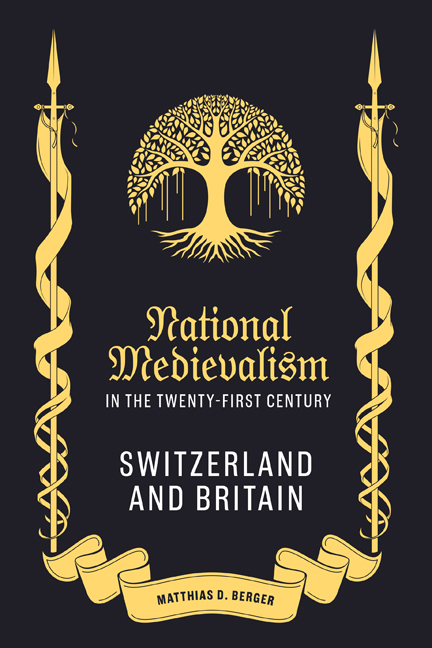Book contents
- Frontmatter
- Dedication
- Contents
- List of Illustrations
- Acknowledgements
- Author’s Note
- List of Abbreviations
- Introduction
- 1 Constructing Continuity: Four Nations Imagine Their Beginnings
- Part I The Politics of Autochthony
- 2 For Freedom Alone: The Scottish Independence Referendum
- 3 2016 and All That: Brexit
- 4 Freiheit statt Vögte: The Swiss National-Conservatives
- Part II The Others of National Medievalism
- 5 Masculine Middle Ages: Gender
- 6 In Strange Lands: Race, Ethnicity, Immigration
- Conclusion: The Demands of the Past
- Afterword: National Medievalism in the Age of COVID-19
- Bibliography
- Index
- Medievalism
Conclusion: The Demands of the Past
Published online by Cambridge University Press: 17 December 2023
- Frontmatter
- Dedication
- Contents
- List of Illustrations
- Acknowledgements
- Author’s Note
- List of Abbreviations
- Introduction
- 1 Constructing Continuity: Four Nations Imagine Their Beginnings
- Part I The Politics of Autochthony
- 2 For Freedom Alone: The Scottish Independence Referendum
- 3 2016 and All That: Brexit
- 4 Freiheit statt Vögte: The Swiss National-Conservatives
- Part II The Others of National Medievalism
- 5 Masculine Middle Ages: Gender
- 6 In Strange Lands: Race, Ethnicity, Immigration
- Conclusion: The Demands of the Past
- Afterword: National Medievalism in the Age of COVID-19
- Bibliography
- Index
- Medievalism
Summary
He was interested in roots and beginnings; he dived into deep pools; he burrowed under trees and growing plants; he tunnelled into green mounds; and he ceased to look up at the hill-tops, or the leaves on trees, or the flowers opening in the air: his head and his eyes were downward.
Most of our history is invented and it is better that way.
IN 2016, DAVID Rieff asked: might twenty-first-century societies be remembering too much for their own good?3 The question was not, in fact, a new one. Others had proposed, as Rieff does, that under certain circumstances, ‘Lethe is a cure’. Rieff was thinking primarily of cultural memories of historical wrongs. He argues that, absent the possibility of achieving both peace and redress for past injuries, it is often better to forget and make one's peace than to meticulously keep alive memories of those injuries. Too often, he writes, ‘collective historical memory as understood and deployed by communities, peoples, and nations […] has led to war rather than peace, to rancor and ressentiment […] rather than reconciliation, and to the determination to exact revenge rather than commit to the hard work of forgiveness’. Rieff sees the drive to remember wrongs committed within living memory as merely part of a continuum which also includes the current appetite for commemorating keystones of collective identity much further in the past. According to him, this proliferation of memory contributes to a situation in which societies risk becoming ‘childish’ – and dangerous.
Rieff 's bleak view of the current flowering of commemorative culture is informed by the many years he spent as a war correspondent. I mention him here because, as I take stock of my findings, the question inevitably lingers: what functions do cultural memories of the nation's medieval past serve in the twenty-first century? It is an urgent question, considering the deeply problematic uses of the past in evidence as national medievalism is currently – among other things – used to enable discrimination and exclusion and to lend prestige to ideologies of nationalist resentment and self-aggrandisement.
- Type
- Chapter
- Information
- National Medievalism in the Twenty-First CenturySwitzerland and Britain, pp. 208 - 212Publisher: Boydell & BrewerPrint publication year: 2023

